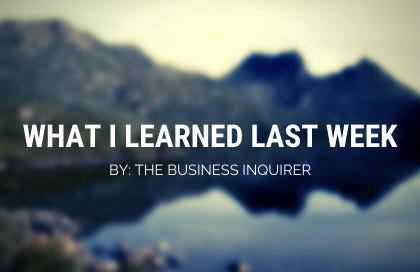🧐What I Learned Last Week
Top M&A content for the week ending Friday, December 23, 2022
What I Learned Last Week curates the most interesting content relating to business acquisitions, operations, entrepreneurship, finance, and more. WILLW is a publication of The Business Inquirer.
Let’s connect: LinkedIn, Twitter
Hello Friends!
As we approach the holidays, I want to wish all of you a very happy, healthy, and meaningful holiday season!
🍾🥂
This issue of What I Learned Last Week is brought to you by DueDilio.
DueDilio is a leading online marketplace focused on M&A due diligence.
We connect business buyers, sellers, intermediaries, and private investors with pre-vetted due diligence service providers.
Our large and growing network of verified independent professionals, boutique and mid-size firms, and subject-matter experts specialize in finance, technology, legal, commercial, and other key areas of business diligence.
Submit your project. Review qualified proposals. Hire service provider.
📰 Articles
Centurica recently updated its Market Watch Report which highlights trends in the online business acquisition space. I thought the chart below was particularly interesting…
Key Insights :
The percentage of listings sold peaked at 65% in Q3 of 2020. From this high point, the ratio consistently declined.
2019 and 2020 were characterized by a market dynamic that strongly favored sellers over buyers. In these years, the combination of ultra-loose monetary policy along with incoming fiscal stimulus once the pandemic started led to something of a buying frenzy, with strong listings, SDE multiples, and short selling times. All of these were rewards enjoyed by sellers. The deepening of the pandemic over 2020 also had the effect of augmenting the traditional advantages enjoyed by online businesses over their brick and mortar competitors, further compounding this trend.
However, this situation appeared to reach its high point around the end of 2020 (as seen by the Sold Rate trends) - and started its way downward, towards a new equilibrium defined by the macroeconomic conditions of a post-pandemic world
— — — — — —
Marketplace Pulse released their 2022 Year In Review where they highlight e-commerce trends. If you’re interested in the e-commerce space, it’s a must-read.
Marketplace Pulse Year in Review 2022
— — — — — —
They Got Acquired published an article on how to decide if working with a business broker is right for you when selling your business.
Do you need help finding a buyer? If yes, a broker is a good way to do that. If you have a buyer in mind, you might not need a broker’s help.
Is your company worth at least a few hundred thousand dollars? Brokers aren’t typically worth the cost for smaller sales, and many brokers won’t take on companies that won’t sell for a couple hundred thousand dollars anyhow. If you’re navigating a small sale and need help finding a buyer, try direct outreach or a marketplace instead.
Is your company likely to sell for 8 figures? In that case, you might want to consider working with an investment bank or specialty advisory firm that supports larger deals.
Do you want help negotiating the terms of the deal, even if you’re bringing your own buyer? That’s the main value of a broker other than finding a buyer, and it’s why Grant, founder of They Got Acquired, recommends working with a broker for most deals over half a million dollars—because that experienced partner can help you avoid common mistakes and negotiate the best outcome.
Deal terms are so much more than sale price: they can include the structure of an earn out, what you’ll be expected to do during the transition, and whether you can start a new business in the space after the sale—all details that can have significant impact on your life.
Should you work with a broker to sell your business? How to choose one and what to expect
— — — — — —
Middle Market Growth highlights a recent panel discussion at ACG LA’s Business Conference on emerging deal-making trends.
Baby boomer-run companies can be an especially promising opportunity. “We’re seeing a lot of founder-owned businesses by baby boomers coming to market because they went through 2001, 2008 and 2010,” Youssefmir continued. “They went through COVID and now, coming out of the pandemic, they thought things were starting to get better, and they walk headlong into inflation and rising rates. They’re just like, ‘I’m out, exit now before it gets too bad, I don’t have the energy to run through another cycle.’”
The current environment may also support increased add-on acquisition activity. Saha and Youssefmir agreed that companies with strong cash flow should aggressively pursue a roll-up strategy as deal structures begin to favor equity over third-party debt.
Where M&A Opportunities Lie: Baby Boomers, Infrastructure and Independent Sponsors
🧵 Twitter
I have this conversation at least 2x a week with a DueDilio client. Diligence is very important but make sure to balance it with the transaction size. Don’t overthink it in smaller deals…

Surprising statistic on buyer/seller litigation. Good thread on some possible causes…

Balance the short-term with the longer-term when performing due diligence…

Great discussion of industries to be weary of…

Observations for those interested in commercial landscaping…

How to prepare for that first buyer/seller meeting…

Tips on starting a local service business…

🤔 Thoughts, Events, Other
For Sale By Biz Owner
I want to share a new marketplace that recently launched - BizSalebyOwner. It’s a sort of Microacquire but for SMBs. It allows business owners to list their business directly on the marketplace without using a broker. Of course, an M&A advisor is available to assist but it’s up to the business seller whether they want to hire one or not.
Check it out 👉 BizSalebyOwner
🛠 Tools & Resources
I want to share some tools & resources that I have found helpful. Please note that some of these may contain affiliate links. This means that I may receive compensation if you sign-up and use them.
X5 Deals - Proprietary deal sourcing. They do the outreach and send you relevant, actionable deals directly into your inbox.
Curators - Proprietary deal sourcing. You need targets that fit your investment criteria, and Curators delivers week after week - we even update your personalized database on a daily basis with new information on best-fit targets.
BizNexus - Proprietary deal flow, deal aggregator, and exit prep. Local Boston company and I consider the founder (Adam Ray) a friend.
PrivSource - Deal aggregator for lower and middle-market listings.
The Website Flip - a newsletter that sends content sites for sale to your email inbox. They send deals each Wednesday and Friday.
Kumo - Find every deal in one complete platform. Spend less time sourcing deals and more time closing them. Kumo aggregates 180K+ business listings into one easy-to-use platform.
Deal Flow Scout - Peer-to-peer deal flow exchange. Free, open, transparent.
Deal Sourcing Guide - A directory I put together of online marketplaces, brokers, DFY deal flow, and more.
That’s all for this issue of What I Learned Last Week!
Help us improve with anonymous feedback. How did you like this issue of the newsletter?
If you enjoyed reading this newsletter, why not share it?
Let’s connect: LinkedIn, Twitter
Important Disclaimer: This newsletter is provided for informational & educational purposes only, and should not be relied upon as legal, business, investment, or tax advice. This newsletter may link to other websites and certain information contained herein has been obtained from third-party sources. While taken from sources believed to be reliable, it has not been independently verified. The Business Inquirer makes no representations about the enduring accuracy of the information or its appropriateness for a given situation. References to any companies, securities, listings, investments, or digital assets are for illustrative purposes only and do not constitute an investment recommendation or offer to provide investment advisory services. Charts and graphs provided within are for informational purposes solely and should not be relied upon when making any business, tax, or investment decisions. Content in this newsletter speaks only as of the date indicated. Any projections, estimates, forecasts, targets, prospects and/or opinions expressed in these materials are subject to change without notice and may differ or be contrary to opinions expressed by others.






